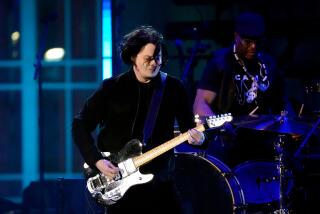‘Drums Across America’ Fails to Drum Up a Crowd
Superstar Stevie Wonder made an appearance, but not even he, or a name like “Drums Across America” and a cause as American as it can come--the plight of Navajo Indians--could lure enough people to fork out $25 to fill even half of the seats in a Burbank theater.
The all-day benefit concert at the Starlight Amphitheatre, billed as a big fund-raiser to aid several hundred Navajo Indians who do not want to be forced off land near Big Mountain, Ariz., wound up being a big money-loser instead.
Unlike the recent, and massive, “We Are the World,” “Hands Across America” and “Amnesty International” events, not one cent of ticket sales will go toward the Indians’ legal defense fund, concert producer Bob Grad said.
Paying the Bills
“No money was raised,” he said. “All the ticket sales are going to pay the bills. But money is not the issue here. Our goal was to raise the awareness of the American people about the plight of the Indians.”
By late afternoon less than 800 of the $25 and $20 tickets had been taken in at the gate. But even then, organizers were unsure how many were paid tickets, because, they said, more than 2,000 of the 4,000 available seats had been given away in the wake of lagging sales last week.
The concert, scheduled to last until 9:30 p.m., featured actor-comedian Cheech Marin, actress Linda Blair, singers Bonnie Bramlett, Ritchie Havens, Rita Coolidge and an Indian band called Redbone. Actor Dan Haggerty, Singer Janis Ian and comedian Rich Little canceled at the last minute, Grad said.
Although Grad did not know Sunday how much money was brought in, the amount will not be enough to cover the $110,000 in production costs.
But, Grad said, media coverage of the event was enough to satisfy his goal of “consciousness-raising.”
“My idea from the start was to have a concert and see what happens,” Grad said. “I’m pleased with the turnout and a lot more people are aware of the situation now.”
The concert was to have benefited hundreds of traditionalist Navajos who are being forced by the U.S. government from their tribal land on the Big Mountain Reservation in Arizona, land the Navajo has occupied for generations.
By decree of the courts and Congress, the largest forced relocation since Japanese-Americans were interned during World War II was ordered in 1974 to end a territorial land dispute between the Navajos and the nearby Hopi tribe.
By July 6, the several hundred remaining Navajos, out of the 12,000 who have been leaving since 1977, must vacate the land, which now belongs to the Hopi.
The concert was supposed to raise money for the Big Mountain Legal Defense/Offense Committee, which has been waging a legal and public relations battle to stop the relocation. World Concerts for Humanity, a nonprofit organization that staged the event, had hoped to attract a capacity crowd
Secondary Concern
A representative with the Big Mountain support group in the Los Angeles area was disappointed with the low turnout, but said that money was secondary to the publicity.
“Life is important to our people. Religion is important. . . . We do not want to leave our land. We want to stop the relocation,” said Dranick Benally, 36, of Bell, a Navajo. “I wish more would have been here, but maybe people will at least know what is happening.”
Several concert-goers were miffed that their ticket money would go to production costs instead of the Indians.
“They should have told us that the money wasn’t going to go towards the cause,” said Renee Cambaliza, 32, of Tujunga, who bought a $20 ticket. “I was expecting more people. I’d be real disappointed if I were the producer and looked up at this little crowd.”
“How sad,” one woman told another as she took a seat. “Where are all the people?”
A concert spokeswoman blamed the lack of pre-publicity about the event as the culprit for the low attendance. She said a disagreement between several Indian support groups over how to advertise the event delayed the publicity campaign.
More to Read
The biggest entertainment stories
Get our big stories about Hollywood, film, television, music, arts, culture and more right in your inbox as soon as they publish.
You may occasionally receive promotional content from the Los Angeles Times.










